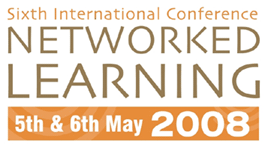

Learners' Experiences with Learner Support in Networked Learning Communities
Benjamin Kehrwald
Massey University, B.A.Kehrwald@massey.ac.nz
Abstract
This paper addresses the issue of learner support in networked learning communities by drawing out key findings of an exploratory study into the relationship between online social presence and learner support in networked learning. The aims of the paper are, first, to promote understanding of learners’ experiences with learner support in networked learning and, second, to inform the ongoing development of learner support system in that context.
Historically associated with distance education, learner support is gaining currency in a variety of educational contexts. Increasing interest in lifelong learning has resulted in changed demographics in higher and further education. Constructivist pedagogical approaches and the related learner centredness have refocused the design and implementation of learning programs on the learner experience. The marketisation of education has changed the dynamics of the institution--student relationship and necessitated a consideration of learners as consumers or clients. Together, these forces have emphasised the role of learner support in increasing the satisfaction, retention and success of learners. Simply put, learner support adds value for learners. It addresses their needs and empowers them to create learning experiences which are more personally meaningful, more relevant and more productive. Education has become a service industry and learner support is a key component of that service.
Learner support in networked learning merits particular attention because it introduces potentially unfamiliar learning conditions associated with networked learning. These include pedagogical approaches which emphasize collaborative process over individual ones and highlight concerns over learning skills and equitable social practice; learner centeredness and the implied role changes for learners; the use of new, novel or unfamiliar technology tools; the physical distance between learners in distributed groups; and the social distance between learners introduced by mediating technologies.
The general question addressed in this paper is: How do learners in online courses experience learner support within a course, particularly in the (a) infrastructure of the course and (b) the human--human interaction within the course? Focussing on learner experiences, the study included four networked learning courses as part of a collective case study design. Information on learner experiences was collected using a dialogical process consisting of five phases: questionnaire, initial interview, group discussion, second interview and summary group discussion. This process acted as an extended conversation which allowed respondents to identify, explicate and reflect on their experiences as networked learners, then work collaborative to construct shared understandings of the phenomena in question. Information was analysed using an iterative thematic analysis and the quality of findings was enhanced through a combination of multiple forms of triangulation and extensive respondent validation.
The findings focus on learners’ experiences with learner support in the forms of (a) interpersonal interaction and (b) supportive infrastructure which facilitates learning activity. The discussion highlights three issues which inform the provision of learner support in networked learning environments: (1) the identification of support mechanisms valued by learners; (2) the disconnect between learners expectations for support and the practicalities of learning activity in networked environments; and (3) the conceptual problem of imaging learner support within networked community structures.
| About NLC |
2008 Conference Papers
| Conference Committee| Keynote
Speakers
| Papers from previous NL conferences |Research Seminars| Current Conference
| Sponsors | Contact
|
